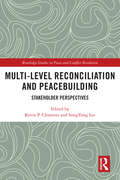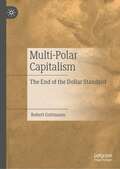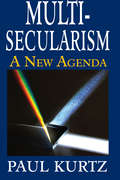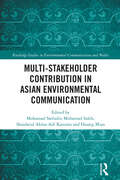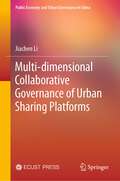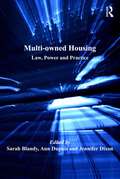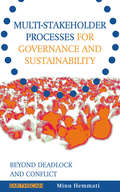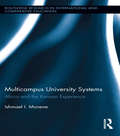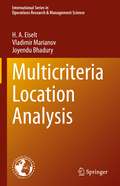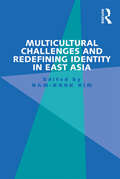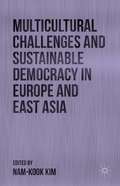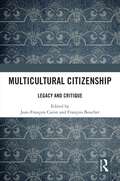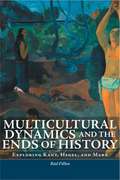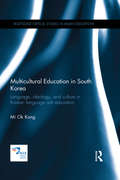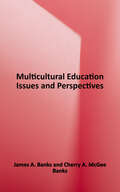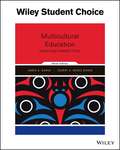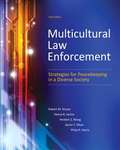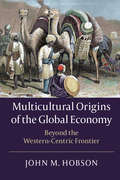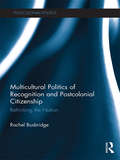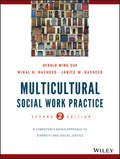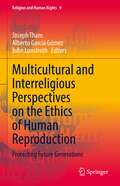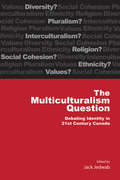- Table View
- List View
Multi-Level Reconciliation and Peacebuilding: Stakeholder Perspectives (Routledge Studies in Peace and Conflict Resolution)
by Kevin P. Clements and SungYong LeeThis edited volume examines the group dynamics of social reconciliation in conflict-affected societies by adopting ideas developed in social psychology and the ‘everyday peace’ discourse in peace and conflict studies. The book revisits the intra- and inter-group dynamics of social reconciliation in conflict-affected societies, which have been largely marginalised in mainstream peacebuilding debates. By applying social psychological perspectives and the discourse of everyday peace, the chapters explore the everyday experience of community actors engaged in social and political reconciliation. The first part of the volume introduces conceptual and theoretical studies that focus on the pros and cons of state-level reconciliation and their outcomes, while presenting theoretical insights into dialogical processes upon which reconciliation studies can develop further. The second part presents a series of empirical case studies from around the world, which examine the process of social reconciliation at community levels through the lens of social psychology and discourse analysis. This book will be of much interest to students of peacebuilding, conflict resolution, social psychology, discourse analysis and International Relations in general.
Multi-Polar Capitalism: The End of the Dollar Standard
by Robert GuttmannHistory teaches us important lessons, provided we can discern its patterns. Multi-Polar Capitalism applies this insight to the crucial, yet often underappreciated issue of international monetary relations. When international monetary systems get first put into place successfully, such as the “classic” gold standard in 1879, Bretton Woods in 1945, or the dollar standard in 1982, they structure relations between the system’s centre and the rest of the world so that others can catch up to the leader. But this growth-promoting constellation, a vector for accelerating globalization, runs its course eventually amidst mounting overproduction conditions in key sectors and spreading financial instability. Such periods of global crisis, from the Great Depression of the 1930s to stagflation in the 1970s and creeping deflation during much of the 2010s, force restructuring and policy reforms until conditions are ripe for a renewed phase of sustained expansion.We are facing such a turning point now. As we are moving from a US-dominated world economy towards a multi-polar configuration, we will also see the longstanding dollar standard give way to a multi-currency system. Three currency blocs rooted in the dollar, euro, and yuan will be dominated respectively by the United States, the European Union, and China, each a power centre representing a distinct variant of capitalism. Their complex mix of competition and cooperation necessitates new “rules of the game” promoting the shared pursuit of global public goods, in particular the impending zero-carbon transition, lest we allow fragmentation and conflict shape this next chapter of our history.Multi-Polar Capitalism adds to a century of research and debate on long waves, those roughly half-century cycles first identified by the great Soviet economist Nikolai Kondratiev in the early 1920s, by highlighting the role of the international monetary system in this distinct boom-and-bust pattern.
Multi-Secularism: A New Agenda
by Paul KurtzThe contemporary world is witness to an intense controversy about secularism. This controversy has intensified due to the presence of fundamentalism, which challenges secular society and the secularization of philosophical ideas and ethical values.Secularists maintain that the state should not impose a religious creed upon citizens and should respect freedom of conscience, the right to believe or disbelieve in the prevailing orthodoxy. This right is guaranteed by the First Amendment to the US Constitution and the Rights of Man enunciated in the French Revolution. Yet many powerful religious institutions do not accept this principle.Paul Kurtz argues that secularism needs to be allied to the emergence of democratic institutions that respect individual freedom and the pluralistic society. He argues that a defense of secularism entails a defense of the civic virtues of democracy, which include the toleration of dissent and alternative lifestyles and the willingness to negotiate differences. Consequently, secularism will take different forms in different societies; the term multi-secularism best describes that. Many people believe that it is impossible to maintain a moral order without the support of religion. Kurtz vigorously denies that, and this volume attempts to explicate the values and principles of secular morality, which he sees as the cornerstone of the open democratic society.Kurtz was involved in the campaign for secularism throughout his career as a philosopher. This book reflects his participation in this battle and extends his thinking to new areas.
Multi-Stakeholder Contribution in Asian Environmental Communication (Routledge Studies in Environmental Communication and Media)
by Huang Miao Mohamad Saifudin Mohamad Saleh Shaidatul Akma Adi KasumaMulti-Stakeholder Contribution in Asian Environmental Communication focuses on how diverse actors can come together to promote sustainable environmental practices.Bringing together 25 environmental communication scholars and practitioners across 15 innovative chapters, this book explores the dynamic roles of stakeholders – ranging from governmental bodies and non-profit organisations to local communities and industry players – involved in advancing environmental communication across the Asian continent. Drawing on a rich tapestry of case studies and interdisciplinary perspectives, the book sheds light on the interplay of religious, cultural, political, and economic factors that shape environmental communication strategies and public perception in Malaysia, Indonesia, Bangladesh, China, Thailand, Iran, Japan, and Pakistan. It probes into contemporary issues such as Islamic environmental communication, gender roles, social media, political communication, the role of games and gaming companies, as well as the portrayal of ecological messages in film. Overall, this book aims to bridge the gap between theory and practice and will make a significant contribution to the growing literature on multi-stakeholder contribution in environmental communication, particularly in the Asian context.This volume will be of great interest to practitioners, policymakers, and researchers working in the field of environmental communication.
Multi-dimensional Collaborative Governance of Urban Sharing Platforms (Public Economy and Urban Governance in China)
by Jiachen LiThis book gives a brief review of current development models and governance of urban sharing platforms, and looks into the economic efficiency of a novel market transaction model of sharing economy, which has been accelerated by high-density urban population and the Internet technology. With an aim to solve current problems featuring excessive competition, waste of resources, security risks, and unfair competition, this book delves into the two governance models in accommodation sharing platforms and bike and car sharing platforms and puts forward a multi-dimensional collaborative governance model that involves the participation of enterprises, the government, and the community. Under such a model, the platforms may utilize their own key technologies to implement supervision and solicit feedback; the government may resort to tax regulation and reallocating shared space to mitigate the negative externality effect and promote fair competition; and the community, as the basic unit of a city, may play its part through on-site participation and real-time feedback.
Multi-owned Housing: Law, Power and Practice
by Ann DupuisThis internationally edited collection addresses the issues raised by multi-owned residential developments, now established as a major type of housing throughout the world in the form of apartment blocks, row housing, gated developments, and master planned communities. The chapters draw on the empirical research of leading academics in the fields of planning, sociology, law and urban, property, tourism and environmental studies, and consider the practical problems of owning and managing this type of housing. The roles and relationships of power between developers, managing agents and residents are examined, as well as challenges such as environmental sustainability and state regulation of multi-owned residential developments. The book provides the first comparative study of such issues, offering lessons from experiences in the UK, the US, Australia, New Zealand, Israel, Hong Kong, Singapore and China.
Multi-stakeholder Processes for Governance and Sustainability: Beyond Deadlock and Conflict
by Minu HemmatiGovernments, business, international bodies and local groups are turning to multi-stakeholder processes to find practical ways forward. This book explains how MSPs can be organized to deliver their potential for successful resolution of complex issues and for sustainable development. It includes detailed examples and provides practical checklists, explaining how to get beyond adversarial politics and achieve positive results.
Multicampus University Systems: Africa and the Kenyan Experience (Routledge Research in International and Comparative Education)
by Ishmael I. MuneneIn the face of increasing social demand and cutbacks in state budgetary support, universities in African countries are now turning towards a multicampus system strategy. As African governments have adopted neoliberal education policies that place premium on entrepreneurialism, profit making, privatization, and markets as drivers of university development, a reshaping of the academic work and organizational framework have taken place. However, little is known about the impact of this paradigm shift on access, quality and governance in higher education. This book fills the void in research and academic knowledge about the impact of the emerging university configurations in Africa. It analyzes the paradox surrounding the performance of multicampus university systems as avenues of broadening university access but whose structural success may be qualitatively contested. This book offers a refreshing examination of the African multicampus university system from both an African and global perspective. It makes use of empirical data from Kenya collected during extensive fieldwork along with substantive library and documentary resources on the rest of the continents to fortify arguments and demonstrate important conclusions. This allows for a comparative analysis of policies and strategies used in the establishment of campuses, both within and beyond national boundaries in the continent, and will be a welcome contribution to the existing repertoire on African universities.
Multicriteria Location Analysis (International Series in Operations Research & Management Science #338)
by Vladimir Marianov H. A. Eiselt Joyendu BhaduryThis book applies Multicriteria Decision Making (MCDM) tools and techniques to problems in location analysis. It begins with a generic model for MCDM and subsequently develops specific versions of the technique for particular location problems. Throughout the book, MCDM is understood to encompass all tools and techniques that choose or rank existing or feasible solutions, including discrete multi-attribute decision making (MADM) problems, which typically include an attribute table that specifies the consequences of each decision with regard to the given criteria, as well as multi-objective linear problems (MOLPs), which incorporate all objectives in a single optimization problem. The book is organized as follows: the first four chapters introduce readers to the basic tools and techniques used in single-objective optimization, multicriteria decision making, location analysis, and other tools, such as statistical regression and geographical information systems. This is followed by ten chapters on model applications, each of which introduces readers to a specific location problem and applies one technique to solve it. The book is then wrapped up in a closing chapter that looks at the location process from a practitioner’s point of view. This book is intended as a textbook for upper-undergraduate and master-level courses on location analysis. It will also benefit decision-makers who actually need to locate facilities.
Multicultiphobia
by Phil RyanOfficial multiculturalism, established as Canadian government policy in 1971, has drawn criticism from many scholars and journalists who view it as a potential threat to a strong, unified Canadian society. In this timely and original book, Phil Ryan examines the emergence and influence of these criticisms, which continue to provoke an anxiety he calls "multicultiphobia." Although Ryan argues that multicultiphobic discourse is often marred by important errors of fact and interpretation, a systematic inspection of news coverage and parliamentary debates reveals the persistent influence of these critiques and their underlying concerns.Rather than simply dismissing multicultiphobia, Ryan acknowledges that critics of multiculturalism have identified issues about which Canadians need to talk. Does multiculturalism discourage adaptation and encourage 'cultural walls' between Canadians? Does it promote an 'anything goes' relativism? Finally, what do we - both as supporters and critics of multiculturalism - wish to make of Canada's ethnic diversity? Multicultiphobia perceptively tackles all of these questions by means of a sophisticated analysis that encourages a deeper understanding of the issues at the heart of multiculturalism.
Multicultural Challenges and Redefining Identity in East Asia
by Nam-Kook KimGlobalization and increased migration have brought both new opportunities and new tensions to traditional East Asian societies. Multicultural Challenges and Redefining Identity in East Asia draws together a wide range of distinguished local scholars to discuss multiculturalism and the changing nature of social identity in East Asia. Regional specialists review specific events and situations in China, Korea, Japan, Thailand, Vietnam, Singapore, Taiwan, Malaysia, Indonesia, and the Philippines to provide a focus on life as it is lived at the local level whilst also tracing macro discourses on the national issues affected by multiculturalism and identity. The contributors look at the uneven multicultural development across these different countries and how to bridge the gap between locality and universality. They examine how ethnic majorities and minorities can achieve individual rights, exert civic responsibility, and explain how to construct a deliberative framework to make sustainable democracy possible. This book considers the emergence of a new cross-national network designed to address multicultural challenges and imagines an East Asian community with shared values of individual dignity and multicultural diversity. With strong empirical support it puts forward a regulative ideal by which a new paradigm for multicultural coexistence and regional cooperation can be realized.
Multicultural Challenges and Sustainable Democracy in Europe and East Asia
by Nam-Kook KimThis collection examines the current stage of multicultural challenges and their influence on democracy in 12 countries of Europe and East Asia. Contributors draw out the differences between European and East Asian approaches to universalizing locality and localizing global norms regarding human rights and democratic individuality.
Multicultural China
by Morris Rossabi Rongxing Guo Eui-Gak Hwang Uradyn E. Bulag Michael A. Crang Thomas Heberer James A. Millward Gerard A. Postiglione Chih-Yu Shih Nicholas Tapp Luc Changlei GuoWith its easy-to-use format, this book provides a collection of annual data on China's 56 ethnic groups. It is a resource book that profiles the demography, employment and wages, livelihood, agriculture, industry, education, science and technology, culture, sports, and public health for each of these ethnic groups. This material, which is compiled from a variety of sources, will be of great value to researchers, businesses, government agencies, and news media. In this book, data are presented on an ethnic group-by-ethnic group basis, and the ethnic groups are ordered alphabetically, from the Achang to the Zhuang. Though most of the data are as of 2011 - the latest year when our research was conducted, we also provide some historical data for a few of indicators. This is intended to help readers to conduct time-series comparisons and analyses.
Multicultural Citizenship: Legacy and Critique
by Jean-François Caron François BoucherMulticultural Citizenship: Legacy and Critique allows the philosopher an opportunity to consider the evolution and transformation of Will Kymlicka’s theories from Multicultural Citizenship: A Liberal Theory of Minority Rights.Canonical in the field of multiculturalism, Will Kymlicka’s work developed an original way of recognizing and accommodating ethnic groups and national minorities through liberal democratic principles. This new volume brings together expert scholars to evaluate the impact of Kymlicka’s book on their own views and the field’s general progression over the past three decades and brings Kymlicka to face new questions challenging multiculturalism and re-evaluate the main ideas of his original theory by reflecting on its development. Through engagement with the contributors’ chapters, Kymlicka ends this edited collection with proposals for new ways of understanding multiculturalism at a time of rising anti-immigration populism and natalist movements.This book offers a modern outlook on multiculturalism with contributions from a diverse group of authors as well as Will Kymlicka himself and will be of great interest to scholars and students of migration, nationalism, minority rights, sociology, law, and politics.
Multicultural Dynamics and the Ends of History: Exploring Kant, Hegel, and Marx (Philosophica)
by Real FillionMulticultural Dynamics and the Ends of History provides a strikingly original reading of key texts in the philosophy of history by Kant, Hegel, and Marx, as well as strong arguments for why these texts are still relevant to understanding history today. Réal Fillion offers a critical exposition of the theses of these three authors on the dynamics and the ends of history, in order to provide an answer to the question: "Where are we headed?" Grounding his answer in the twin observations that the world is becoming increasingly multicultural and increasingly unified, Fillion reasserts the task of the speculative philosophy of history as it had been understood by German philosophy: the articulation and understanding the historical process as a developmental whole. Fillion's interpretation engages many recent strands of social and political thought in order to provide a new understanding of current events, and possible futures, grounded in the understanding of the dynamics of the past and the present provided by Kant, Hegel, and Marx. The result is a rich and timely answer to the question of where our world is headed today.
Multicultural Education in South Korea: Language, ideology, and culture in Korean language arts education (Routledge Critical Studies in Asian Education)
by Mi Ok KangThis book examines the political, ideological, and socio-cultural politics underlying the 2009 National Multicultural Curriculum Reform and recent multicultural education policies in South Korea. Unlike the conservative groups in Western countries who argue that supporting cultural diversity and the cultural rights of minority groups balkanizes ethnic differences and divides the community, the New Rights and the conservative groups in South Korea have been very supportive of multicultural discourses and practices and have created many multicultural policy agendas geared toward ushering in what have they called "the multicultural era." Through the Critical Discourse Analysis (CDA) of government multicultural policy documents, a range of media sources, the 2009 national curriculum reform policy documents, and the 200 Korean language arts textbooks from 23 textbook publishers, Multicultural Education in South Korea: Language, ideology, and culture in Korean language arts education examines how the conservative Korean government’s interpretation and practices of multiculturalism have been infiltrated and challenged by progressive and migrant-led agents/agencies. The analysis of academic, official, and popular discourses on migrant Others is focused on, but not limited to: "The multicultural era" and struggles for hegemonic power; Politics of multicultural knowledge control in education and society; Formation of discourses on multicultural society and multicultural education; Examining the national curriculum: The politics of representing migrant Others; and The hidden curriculum of multicultural education: Limitations and possibilities. The author’s insightful discussion on the politics of knowledge, education, and teaching in multicultural societies will prove particularly useful to policy makers, think-tank officials, and academic scholars in education.
Multicultural Education: Issues and Perspectives
by James A. Banks Cherry A. McGee BanksAs diversity continues to increase in the United States, ethnic, cultural, social-class, and linguistic gaps are widening between teachers and their students. The rapidly changing educational landscape presents unique challenges and opportunities for addressing diversity both creatively and constructively in schools. Multicultural Education helps current and future educators fully understand sophisticated concepts of culture; become more effective practitioners in diverse classrooms; and view race, class, gender, social class, and exceptionality as intersectional concepts. Now in its tenth edition, this bestselling textbook assists educators in effectively responding to the ways race, social class, and gender interact to influence student behavior and learning. Contributions from leading authorities in multicultural education discuss the effects of class and religion on education; differences in educational opportunities for male, female, and LGBTQ students; and issues surrounding non-native English speakers, students of color, and students with disabilities. Contemporary in relevance, this timely volume promotes multicultural education as a process of school reform. Practical advice helps teachers increase student academic achievement, work effectively with parents, improve classroom assessment, and benefit from diversity.
Multicultural Education: Issues and Perspectives
by James A. Banks; Cherry A. McGee BanksThere is a wide and growing ethnic, cultural, social-class, and linguistic gap between many of the nations teachers and their students. Multicultural Education: Issues and Perspectives, 9th edition, is designed to help current and future educators acquire the concepts, paradigms, and explanations needed to become effective practitioners in culturally, racially, linguistically, and social-class diverse classrooms and schools. An important goal of the 9th edition is to help educators attain a sophisticated understanding of the concept of culture and to view race, class, gender, social class, and exceptionality as interacting concepts rather than as separate and distinct.
Multicultural Law Enforcement: Strategies for Peacekeeping in a Diverse Society, Sixth Edition
by Robert M. Shusta Deena R. Levine Herbert Z. Wong Aaron T. Olson Philip R. HarrisMulticultural Law Enforcement: Strategies for Peacekeeping in a Diverse Society, 6e is designed for use in criminal justice and social/behavioral science courses, as well as law enforcement in-service training classes and police academies. The textbook is also directly applicable in colleges, university and vocational programs offering emergency services for: police, fire and rescue, emergency medical, emergency management, 911, military as well as civil emergency services. This comprehensive, student-friendly text, like no other on the market, is designed for students who will become part of a diverse workforce and who, in their future careers, will encounter citizens from many backgrounds. Multicultural Law Enforcement: Strategies for Peacekeeping in a Diverse Society, 6e, addresses topics of key concern to criminal justice and emergency service professionals, including cultural awareness, prejudice, bias, racial profiling, hate and bias crimes, and cross-cultural communication. It covers issues of workforce diversity such as the recruitment and retention of minorities. The content deepens readers' understanding of many demographic groups in our nation's multicultural population, broadly focusing on ethnicity, race, culture and sexual orientation as well as on other societal sub-groups, including immigrants, refugees, homeless, mentally ill and gangs. The book also addresses multicultural issues that relate to terrorism, homeland security and disaster preparedness. The information and insights contained in the text will no doubt contribute to the increasing need for professionalism required of law enforcement in responding to multicultural diversity issues. Using examples from case studies and established guidelines within law enforcement, the text focuses squarely on the contact police officers and civilian employees have with the community, emphasizing the importance of cultural awareness, understanding, and respect. In adopting this textbook, instructors will have access to a complete learning package designed to stimulate students' higher levels thinking and awareness. Teaching and Learning Experience This book serves as a focused roadmap for law enforcement with its comprehensive look at the impact of cross-cultural and diversity challenges within the criminal justice field. It provides: Extensive, in-depth coverage: the scope sets this text apart from its competitor Culture-specific chapters: exposes readers to an understanding of cultural, racial and ethnic groups without relying on stereotypical descriptions Complete learning package: makes course preparation and learning easier
Multicultural Origins of the Global Economy: Beyond the Western-Centric Frontier
by John M. HobsonWesterners on both the left and right overwhelmingly conflate globalisation with Westernisation and presume that the global economy is a pure Western-creation. Taking on the traditional Eurocentric Big Bang theory, or the 'expansion of the West' narrative, this book reveals the multicultural origins of globalisation and the global economy, not so as to marginalise the West but to show how it has long been embedded in complex interconnections and co-constitutive interactions with non-Western actors/agents and processes. The central empirical theme is the role of Indian structural power that was derived from Indian cotton textile exports. Indian structural power organised the first (historical-capitalist) global economy between 1500 and c.1850 and performed a vital, albeit indirect, role in the making of Western empire, industrialisation and the second (modern-capitalist) global economy. These textiles underpinned the complex inter-relations between Africa, West/Central/East/Southeast Asia, the Americas and Europe that collectively drove global economic development forward.
Multicultural Politics of Recognition and Postcolonial Citizenship: Rethinking the Nation (Postcolonial Politics)
by Rachel BusbridgeThis book examines claims for recognition of cultural difference from immigrant and Indigenous minorities, highlighting the ways in which they intersect with ideas of national community. Busbridge argues that there is an important, albeit under-explored, relationship between nation and multicultural politics of recognition. Drawing on the Australian context, the book explores how nation features as a productive, if somewhat ambivalent, discursive resource in contemporary Muslim and Aboriginal struggles to be recognised. In demanding recognition, minorities enter into the business of ‘making the nation’ by positing alternative conceptions of national identity, culture and belonging that are more attentive to their differences and claims. This dynamic is engaged as an expression of ‘postcolonial citizenship’. Postcolonial citizenship is imagined in terms of the ways in which minority groups actualise multicultural realities through rewriting ideas of national community. It underlines the critical importance of revising the power relations that deem some groups ‘more national’ and others less so – and which, in Western multicultural societies, are typically tied to notions of the ‘West’ and its ‘others’. This book is an important conceptual, theoretical and political intervention that brings postcolonialism and multiculturalism into dialogue on the increasingly potent issues of nation and national identity. It will be of great interest to scholars and students of sociology, politics, postcolonial studies, culture, identity and nation.
Multicultural Social Work Practice
by Derald Wing Sue Mikal N. Rasheed Janice Matthews RasheedA thorough exploration of diversity and social justice within the field of social work Multicultural Social Work Practice: A Competency-Based Approach to Diversity and Social Justice, 2nd Edition has been aligned with the Council on Social Work Education's 2015 Educational Policy and Standards and incorporates the National Association of Social Workers Standards of Cultural Competence. New chapters focus on theoretical perspectives of critical race theory, microaggressions and changing societal attitudes, and evidence-based practice on research-supported approaches for understanding the influence of cultural differences on the social work practice. The second edition includes an expanded discussion of religion and spirituality and addresses emerging issues affecting diverse populations, such as women in the military. Additionally, Implications for Multicultural Social Work Practice' at the end of each chapter assist you in applying the information you have learned. Multicultural Social Work Practice, 2nd Edition provides access to important guidance regarding culturally sensitive social work practice, including the sociopolitical and social justice aspects of effective work in this field. This thoroughly revised edition incorporates new content and pedagogical features, including: Theoretical frameworks for multicultural social work practice Microaggressions in social work practice Evidence-based multicultural social work practice New chapter overviews, learning objectives, and reflection questions Multicultural Social Work Practice, 2nd Edition is an integral guide for students and aspiring social workers who want to engage in diversity and difference.
Multicultural and Interreligious Perspectives on the Ethics of Human Reproduction: Protecting Future Generations (Religion and Human Rights #9)
by Joseph Tham Alberto Garcia Gómez John LunstrothThis book includes a number of distinct religious and secular views on the anthropological, ethical and social challenges of reproductive technologies in the light of human rights and in the context of global bioethics. It includes contributions of bioethics experts from six major religions—Buddhism, Confucianism, Christianity, Islam, Hinduism and Judaism—as well as secular authors. The chapters include commentaries discussing the content cross-religious/secular tradition to give a comparative perspective. Not only the volume editors but also the contributing authors took part in reviewing each others’ chapter making this a unique collected volume, not common in interreligious dialogue today. This text appeals to researchers and students working in the fields of bioethics and religious/secular studies.
Multiculturalism Question: Debating Identity in 21st Century Canada
by Jack JedwabCanada's policy of multiculturalism has been the object of ongoing debate since it was first introduced in 1971. Decades later, Canadians still seem uncertain about the meaning of multiculturalism. Detractors insist that government has not succeeded in discouraging immigrants and their descendants from preserving their cultures of origin, undercutting a necessary identification with Canada, while supporters argue that immigrant groups' abilities to influence their adjustments to Canada has strengthened their sense of belonging. Beyond what often seems to be a polarized debate is a broad spectrum of opinion around multiculturalism in Canada and what it means to be Canadian. The Multiculturalism Question analyzes the policy, ideology, and message of multiculturalism. Several of Canada's leading thinkers provide valuable insights into a crucial debate that will inevitably continue well into the future.
Multiculturalism Question: Debating Identity in 21st Century Canada (Queen's Policy Studies Series #182)
by Jack JedwabCanada's policy of multiculturalism has been the object of ongoing debate since it was first introduced in 1971. Decades later, Canadians still seem uncertain about the meaning of multiculturalism. Detractors insist that government has not succeeded in discouraging immigrants and their descendants from preserving their cultures of origin, undercutting a necessary identification with Canada, while supporters argue that immigrant groups' abilities to influence their adjustments to Canada has strengthened their sense of belonging. Beyond what often seems to be a polarized debate is a broad spectrum of opinion around multiculturalism in Canada and what it means to be Canadian. The Multiculturalism Question analyzes the policy, ideology, and message of multiculturalism. Several of Canada's leading thinkers provide valuable insights into a crucial debate that will inevitably continue well into the future.
